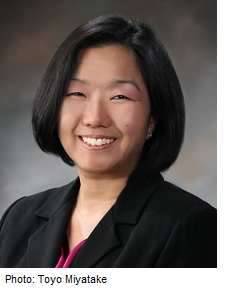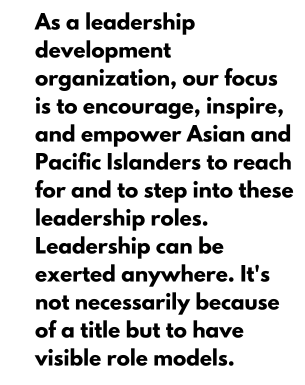
 The
words Asian-American
and leader don’t exactly go hand-in-hand. That’s why LEAP
(Leadership Education for Asian Pacifics) has spent the last 42
years with one goal in mind: to equip Asians and Pacific Islanders
with the tools they need to take the helm in organizations where key
decision-making in business, politics, and education take place.
The
words Asian-American
and leader don’t exactly go hand-in-hand. That’s why LEAP
(Leadership Education for Asian Pacifics) has spent the last 42
years with one goal in mind: to equip Asians and Pacific Islanders
with the tools they need to take the helm in organizations where key
decision-making in business, politics, and education take place.
We spoke to LEAP CEO Linda Akutagawa, a second-generation Japanese American, about what it takes to be a mover and shaker, why our culture hinders it, and how we can take steps to preserve our heritage and still lead.
____________________________
As an Asian American woman who heads the only nonprofit leadership organization for AAPI, who was a big influence on your life?
One of the things my dad instilled was a trait of questioning things and being able to speak up and speak out about things and be willing to engage in conversation. He didn't want me to be afraid of talking or expressing my thoughts and ideas. I've been told that I’m not a typical Asian woman. I'm like, “Yes, I know. And I'm okay with that.”
During your 12 years as CEO of LEAP, have you seen much progress in terms of equity and respect for Asians in the workplace?
There’s some degree of progress, but we're seeing a concerted effort to take us backwards again, and it's not just with Asian Americans. I recently gave a keynote speech, followed by a workshop looking at our history to inform our future. We had a diverse audience with people from Canada, Mexico, and the U.S. Someone came up to me and said they realized that history repeats itself, whether it’s church bombings, acts of hate, and acts to marginalize or exclude. We think we've made progress, but we haven’t.
What steps does LEAP take to ensure that we don’t repeat those parts of history?
Education is important, but with the degree of misinformation out there, who do you believe? All I can say is, we have to keep doing what we do, which is to educate. We have to tell our stories. We have to continue to advocate for more perspectives to be heard. And there are so many Asian perspectives, so we have to make sure we hear more of them. We have to be willing to share our perspectives because there are a lot of people who purport to speak for all of us. That’s why it’s important for all different kinds of people to have a place at the decision making table. Otherwise, you're going to have a very small--but vocal--minority that’s out of step with the majority. It’s dangerous anytime a minority opinion rules over the majority, and the majority lets it happen. Even when we think our stories, voices, perspectives, or opinions don't matter or make a difference, they do.
 Where are you seeing more instances of leadership
taking place?
Where are you seeing more instances of leadership
taking place?
We’re seeing more folks from our community in places of leadership across all industries and sectors. From a business leadership perspective, there are increasing numbers of Asian Americans and Pacific Islanders, but to make a clear distinction, there are definitely many more Asian Americans in visible executive leadership roles in business. We're also seeing lots of well-respected, well-loved businesses that have been started by Asian Americans. That’s great because it elevates our contributions to the world and to this country. We're definitely seeing more Asian Americans--and some Native Hawaiians and Pacific Islanders--in leadership roles in higher education circles. We're certainly seeing it across the political spectrum, and we're seeing more and more Asian Americans and Native Hawaiians and Pacific Islanders (AANHPI) in non-profits and running for elected office. It's good for our community that there are people who look like us who are willing to put themselves out there regardless of their political persuasion and who really have thick skin. We’re definitely seeing more Asian representation in literature, film, and the arts overall, too. When I started at LEAP, it would have been a miracle if we saw one [Asian] person on TV, much less two. As a leadership development organization, our focus is to encourage, inspire, and empower Asian and Pacific Islanders to reach for and to step into these leadership roles. Leadership can be exerted anywhere. It's not necessarily because of a title but to have visible role models.
So what are the areas where you’re asking yourself, “I wish there was more improvement"?
One disappointment is the persistent idea that Asian Americans are the model minority; the idea that we're doing okay and that we don't have problems--we’re all smart, educated, and wealthy. All of these contribute to the idea that we are a community that doesn't have problems. Until all of the attacks on Asian Americans during COVID, people didn't believe we had any. Now people are saying, “Problem solved. Asian Americans are okay so we don't have to worry about them. Let's just go back to helping everybody else who really needs help.”
Why do you specifically differentiate between Asian Americans and AAPIs?
I'm intentionally saying Asian Americans because I know sometimes it's easy to say, AAPIs or AANHPI, but Native Hawaiians and Pacific Islanders shouldn't be swept up into this larger label because the challenges and issues that they continue to face are very different from Asian Americans. There's still a lot that needs to be done to ensure that their communities also get the attention and support they need to thrive as well.
How do you suggest we get rid of the Asian minority myth stereotype?
That's the hard thing. How do we say, “We're not as well off. We're not as smart as people think"? And how do you say that without victimizing us? That's what makes it so insidious. It's so damaging because we should be happy that people don't think that we’re the problem minority.
Because other minorities would love to be in our position.
Exactly. But there aren’t many conversations about Southeast Asian immigrants and refugees who are struggling in this country and who aren’t the model minority. There is diversity in the Asian American diaspora. We have those who are doing very well, and we have those who are not. We have to figure out a simple way to convey this message and just saying, “We're not the model minority” is not going to be enough. The challenge is how do we simply convey this to people without having to get into all the explanations. But we shouldn’t just give up either. We’ve got to keep speaking about it and explaining it.
Where do we start?
It’s continuing to educate inside our communities and then outside our communities with our allies. We could definitely tell the younger generation, but also the elders who may not have learned about it when they were growing up. Storytelling is a really popular theme. People are more willing to listen, understand, and to really think deeply when they listen to personal histories. We need people to speak out, but I would just say it's a burden that we can't place on just the younger generation. Our generation needs to do the same.
Tell us more about LEAP and its target audience.
We have our signature programs, [which range] from our internship programs for college students to mid- to senior-level programming for working adults. I would call ourselves intergenerational. We like to say, “from the classroom to the boardroom” across all life stages, from college and early career to those who are later in their careers who are still looking to advance across sectors. Leadership skills are transferable. If you have the desire and the will, you can learn the skills and use them in different settings. You could develop them in college and then take them to your corporate workplace and then transfer it to the nonprofit world. These skills become part of your skills toolbox.
Is it more effective to learn these skills earlier in life?
It's effective no matter what age. I always hear older people say, “I wish I knew this when I was younger.” But when they were younger, they didn’t have the mindset for it. There's something to be said about having the experience that helps one appreciate certain things. The best leaders are always hungry and curious for ways to learn and to do things differently. Once you get to a place where you think you have nothing to learn, you're going to just be stuck. It’s not always about how things used to be done, but how are things being done now? How can I do things differently? And it doesn't matter whether you’re 50 or 25.
What qualities does LEAP teach its leaders?
LEAP’s leadership framework has five elements. We believe that expanding self awareness is important. Being able to lead, manage change, and continuously learn. Growing high performing teams, coalitions and partnerships, sustaining energy and stamina. They’re important because if you look at leadership in a holistic way, you’ve got to know who you are as a leader. Change is inevitable, and as a leader you have to be able to both lead and manage change. You also have to be able to deal with ambiguity within that change. Regardless of age, a leader has to continuously stay curious and to learn so that they're not just relying on prior knowledge but also looking to advance and push themselves forward. As a leader, you need to bring together coalitions and partnerships. And it’s not just about bringing people together, but how do you help them perform well. Lastly, as a leader, you have to take care of yourself. You have to energize yourself physically, intellectually, psychologically, and spiritually. Leadership is exhausting.
Asian culture doesn’t really prioritize those traits. Does that mean we don’t like being leaders?
We do want to be leaders, and we're willing to be leaders. What becomes important and makes a difference is feeling like we have the skill sets and that we have the support. Many of us don’t want to lose face. We don't want to be embarrassed because we're taught that it doesn't just impact us as an individual, it’s the whole community. I've heard people say, “If you do this, you embarrass not only yourself and your family, but people from the country where we came from.”
Can we still be leaders while preserving our culture?
What we teach is don't look at what you were taught as being all negative. It's really about how do you find that right balance. Being conscious about not bringing shame is not a bad thing. You want to think about framing it a different way, like be thoughtful to others and be thoughtful to all your actions.
I grew up in both cultures and I just had to figure things out. I’m not enough of one or the other. I'm not clearly American enough. I'm not clearly Japanese enough. I'm this interesting blend. As I started to work at LEAP, I started to appreciate both and leverage the strengths of both.
How do we undo something that’s so ingrained in who we are?
That's why the work we're doing is important. We give people the confidence to have the skills. There's different kinds of conditioning between men and women. Men are conditioned to say they can do anything, even though they're completely incompetent. Women say they can do something only if they can do it perfectly. As Asian Americans, there's some kind of cultural conditioning that has been passed on from generation to generation that makes us ask, “should we or should we not?” And too often we hesitate, and sometimes we hesitate too long.
So we provide people with some of the basic skills to at least enable them to feel like, “Okay. I can at least try.” Also, you can have all the skills you want, but you need to have the support--either people encouraging you or people saying, “I have your back.”
Are there enough Asian Americans in leadership positions who can serve as role models for kids?
When you start from a small goal, it can seem like it's never enough. I say that knowing that there are many, many more role models than there were 20 years ago. We have more in the director and VP level than we've ever had, but there can always be more when you think about the entire ecosystem of positions in companies. We're still not there if you look at it in terms of our proportion to the overall population in the U.S.
Depending on the company, we may be proportionate to other companies, but we might be underrepresented in other places. I saw a report a couple years ago that showed that Asian Americans get hired in high numbers, but the higher up they go, the lower their numbers.
Can you explain why?
It’s how leadership is defined. People's definition of what leadership looks like tends not to include Asian Americans. It has to do with the fact that we're just not seen as having leadership qualities or skills that fit. It's so interesting, especially because the Asian community puts so much stock in meritocracy.
It doesn’t make sense because you’d expect a model minority to be in more leadership roles?
It's used against us. We're too smart. We don't have the soft skills. We don't have the leadership skills. We only know how to be told what to do. We don't have vision or know how to think strategically because we're just too smart for our own good. We’re just technocrats and good worker bees.
What progress do you hope to see in the next decade?
We have not only a vision and a mission, but we have a duty to continue to change things for the better. I'd like to see us expand our work outside of the U.S. because there are similar needs in other areas of the world. I’d like there to be a day where LEAP doesn't have to exist. We're working towards creating something where as a community we will be able to create environments where we are respected, where we are in control, where we are listened to, where we are included for our thoughts and opinions, where we are representative of all the talents that exist in our community. I want us to get to the point where our leadership is proportionate to the population in the workplace.
Photo: Toyo Miyatake

